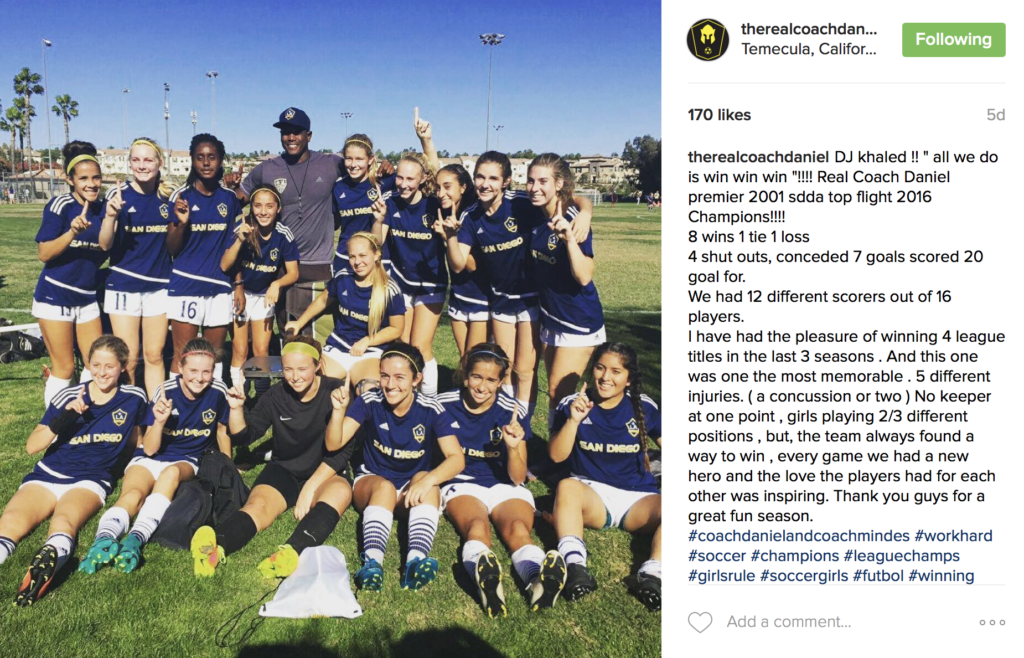Developing Good Habits For All-Around Success
The goal of becoming a top athlete is a long road for anyone to achieve. Many factors go into developing players that compete at the highest level, but a key aspect can start with simple everyday habits as child.
Guest writer Daniel McKell discusses 7 tips for providing positive guidance to youth soccer players, and the ability for them to develop good life habits.
I’ve been on both sides of the fence – I’ve been blessed to be a former college athlete, a former professional player, national team exposure and now I’m a professional soccer coach of elite level players, many who have gone on to play in college and some at the pro level. I often find myself counseling parents who want to know how to make their kids “star” athletes.
There are many factors/variables that contribute to the success of an athlete that are out of your control. Luckily, there are some critical, common traits that have a lot to do with you.
As a parent, it’s important to understand the role you can play in helping your son or daughter become a successful athlete.
The added bonus is that all of this transfers over to being successful in life.

Here are the 7 Things Every Sports Parent Should Know:
1. It Takes Time
Rome wasn’t built in a day, and neither was a star athlete. Every kid develops at a different pace: some are late bloomers, some peak early, and some develop on pace with their maturity level. Some kids are emotionally mature but don’t develop physically until later, and vice versa. It’s important to allow time to take its course.
And don’t discount the many years of struggle it takes your kid to get to their shining moment. We’ve all heard of players who may have struggled for years in one situation for a team, then got a special opportunity and blossomed. It may have been the relationship with the coach, it may have been the chemistry of the team, or it may have just been his time to shine.
2. Practice at Home
Your kid comes to a camp or a private lesson and learns a new skill. Know that what they learned is hardly going to transfer to a game two days later.
In order for a new skill to become permanent, they need to practice 20-30 minutes every day or at least every other day.
As a coach, I’m trying to teach players a work ethic that will develop all year long.
Practicing over and over is the best way to make significant progress. Most (if not all) star athletes have a lot of self-motivation. They sometimes practice with friends, a parent, sibling, a private coach, pick up games, etc. — all outside of their team practices.
3. Practice Hard, Play Even Harder
I tell my soccer players, “From the moment you put on your boots, your head should be in game mode.”
Teach your son or daughter to come to every training ready to play and give it their all, whether it’s practice, a camp, a clinic, a game, etc. Putting in 120% effort at practice naturally translates to 150% in a game, just out of habit. Teach them to have a good work ethic and discipline whenever they touch the ball (or whatever object is in their sport of choice).
4. Be Disciplined
I used to start getting ready for practice or a game the night before by eating a good dinner, laying out my uniform, packing my bag with water and a healthy snack, getting a good night’s rest, and starting the day with a good breakfast.
If your daughter or son shows up to practice missing her jersey, she’s already mentally distracted.
If she didn’t eat well or is dehydrated, she can’t perform at her best.
And make children responsible for themselves! They should pack their own bag and be aware of what they need to eat, even if you guide them.
5. Guide, Then Let Go
Prepare your kids by showing them the routine, then let them do it on their own. I hold my players accountable for forgetting stuff. Missing your socks? You’re going to run/do pushups.
The best thing you can do for your child, in sports and in life, is guide them, then let them go and let them face the consequences of their mistakes. They will learn and grow up a lot quicker and gain independence sooner.
6. Be Understanding, But Be Honest
Stop lying to your child by telling them they’re the best one out there. If your kid’s a star, they will rise to the top. Be understanding when they come to you to express their challenges and discouraging moments by saying, for example, “I know it hurts that you’re not playing at a high level right now, but here’s what you can do to get there.” Then let go.
Letting go is massive. They have to know they can do it without you.
7. Let Them Shine in their Own Way
Remember, there are different ways of being a star. I have a player who is not a star player in terms of skills, but she is the glue to my team. Her star power is what she contributes to the team in terms of emotional support – she even keeps me in check when I’m losing it! Without her, the team would fall apart under pressure.
Everyone shines in their own way, at their own time. That’s the beauty of sports; it builds people for whatever comes next in life.
Top Image: Coach Daniel with the undefeated San Marcos High School Girls Junior Varsity team
McKell is a former pro and college soccer player, San Marcos High School Girls Varsity Coach, LA Galaxy San Diego coach, and owner of 360 Soccer and TheRealCoachDaniel.com where he hosts camps, clinics, and private sessions for competitive soccer players.






